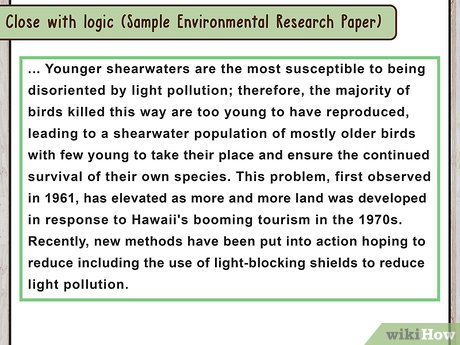If you’re wondering how to conclude a research paper, there are a few key things that you should keep in mind. Read on for tips on how to write the conclusion of a research paper. Avoid the following mistakes: Inability to match the objectives of the research paper to its conclusion. A research paper conclusion should be as simple as possible. It should summarize your work and highlight its essential details. And, of course, it should be short and to the point.
Conclusion section of research paper
The conclusion section of a research paper is where you summarize your work and present the main findings. Make sure to mention anything that is relevant to the bigger picture. This could be a limitation to your study or an error in its design. Additionally, you should elaborate on the significance of your findings. If you took an unconventional approach to your research, the conclusion will give your readers a greater understanding of the overall project. Here are some tips to write an effective conclusion.
Make the conclusion short. This section of your research paper should not be a long, boring summary of what you have done in the previous chapters. Instead, try to communicate the most important takeaways of your research paper in a few sentences. For example, if your study involved looking at how stress affects brain activity using fMRI, the conclusion should focus on the findings. A short summary of the most important points in your research paper will suffice.
Summarizing your work
When writing a summary of your work, you must make sure your readers know that the paper is based on someone else’s work. Almost always, a summary will begin with an introduction to the author, article, or publication. Be sure to include a reference to the source in the bibliography. In addition, you should mention the title of the article. A successful summary will make it easy for readers to find more information about the source.
When summarizing your work in a research paper, it is important to make sure that you capture the main idea of the original source. You can do this by writing down keywords that the author used. When summarizing, think about the main ideas in the source and how they support or contradict your own argument. After you have written the summary, read the original source again to ensure that it is accurate and follows the citation style that your instructor requires.
Highlighting essential details
One of the most important aspects of a research paper is the conclusion. It serves as a bridge from the paper’s introduction to the real world, so that readers can apply the research findings to their lives. A research paper’s conclusion can also be a call to action, offering a solution to an existing problem or proposing a course of action for future studies. Here are some guidelines for writing a successful conclusion:
A research paper conclusion should not be a rambling repetition of what was already presented in the body of the paper. Rather, it should be brief and to the point. An example of a conclusion is “Using fMRI to measure stress, we found that stress induced neurotransmission in the brain can be triggered by a variety of different types of stimuli.” The rest of the section can focus on summarizing the key points.

